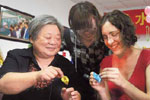Feng Zhaokui
Diaoyu dispute sowed by US
Updated: 2010-09-15 07:55
By Feng Zhaokui (China Daily)
Japan's propaganda on the islands falls into US strategies to create and take advantage of tension in East Asia
The Diaoyu Islands dispute was a disruptive mine planted by the United States into Sino-Japanese relations nearly four decades ago.
When the US decided to return the occupied Okinawa to Japan in 1972, the Diaoyu Islands and adjacent islets, which belong to China, were also handed over to Tokyo. In so doing, the US wanted to prevent China and Japan from getting too close and bring ties between the two countries under its control. Washington's viciously conceived move, a tactic often employed by imperialists, proved useful in serving its interests in the past decades.
| ||||
During a visit to Japan for the signing and exchanging ceremony of the Sino-Japanese Treaty of Peace and Friendship in December 1978, a milestone document in Sino-Japanese relations, then Vice-Premier Deng Xiaoping successfully pushed the two countries to agree to "shelve bilateral disputes for a common development" on the Diaoyu Islands issue. The consensus became a de facto principle that China and Japan abided by in the following years.
However, Japan has time and again taken measures aimed at putting the Diaoyu Islands under its control since the 1990s. The Japanese government has often tried to instill into Japanese people the concept that the islands, which are called Senkaku within Japan, are an indisputable part of Japanese territory. The use of the propaganda machine for such a purpose has been so frequent that those in Japan who admit that the Diaoyu Islands belong to China have become the minority in the country. Disputes about the sovereignty of the islands have even become a taboo subject for the Japanese.
At a governors' meeting held in late May, when Japanese media made an outcry over the "buildup" of the Chinese navy and the so-called pursuit of a Japanese survey ship by a Chinese oceanographic survey vessel, Shintaro Ishihara, the governor of Tokyo who is notorious for his anti-Chinese remarks, challenged then prime minister Yukio Hatoyama's policy in this region.
"Is the Japan-US Security Pact applicable in the case of military conflicts in the waters surrounding the Senkaku?" Shintaro asked. After telling the mayor that the Japan-US security pact applies to the islands, Hatoyama added that the ownership of the Diaoyu Islands should be resolved through negotiations with China. Derogative remarks were made at Hatoyama and some Japanese media described Hatoyama's position as isolated. A number of netizens even denounced Hatoyama as a prime minister who would cause Japan to perish.
In a recent showdown between Japanese Prime Minister Naoto Kan and Ichiro Ozawa, the former head of the Democratic Party of Japan (DPJ), for the party leadership, both played the China card. Pointing to Japan's disputes with China over the sovereignty of the Diaoyu Islands, Ozawa even claimed that the islands have never been China's territory since ancient times. Kan also said he believed that the activities by China's naval forces in the waters off Japan should require Japan's vigilance and that Tokyo should deploy self-defense forces in its southwestern islands to guard against possible threats.
In their eyes, Diaoyu Islands or Senkaku is part of Japanese territory and that, to them, has become a widely recognized fact among the Japanese. Guarding against China's naval activities in this maritime area therefore serves Japan's national interest. Following this logic, winning public approval on this issue has been regarded by Kan and Ozawa as an important weapon to gain votes.
Both Kan and Ozawa believe that the acquisition of the Diaoyu Islands and adjacent islets, whose surrounding maritime waters are rich in resources, by a Japan that has insufficient resources, will be of great significance to Japan's maritime and resource strategy.
In their run-up struggle for DPJ leadership, Kan and Ozawa have said they would inherit Hatoyama's unveiled proposal to build the East Asian community. However, Japan's tough stance on the recent collision between its patrol vessels with a Chinese fishing boat in the waters off the Diaoyu Islands has obviously contravened the common consensus reached with China that the East China Sea will be built into a sea of peace and cooperation. Tokyo's stance will only escalate tensions with Beijing over the Diaoyu Islands and will likely foil its efforts to construct the East Asian community, a target that will better serve Japan's long-term national interests.
Japanese politicians should not place personal or partisan interests over the larger interest of peace and stability in East Asia. It is particularly unwise to pursue political capital by taking advantage of territorial disputes with China and fueling national confrontation between the two neighbors.
It is in Japan's national interests if its politicians take an honest and pragmatic approach toward the Diaoyu Islands and conduct active, pragmatic and peaceful consultations with China.
Both China and Japan can share abundant natural resources in the East China Sea, extricate themselves from the long-standing shackles of territorial disputes as soon as possible and convert potential resources in this area into wealth to realize a win-win result.
The author is a researcher with the Institute of Japanese Studies under the Chinese Academy of Social Sciences.
China Forum
Specials

China dream
Popular Bluff, Missouri, native Catherine Beck never imagined her summer experiences in China would change her career course.



